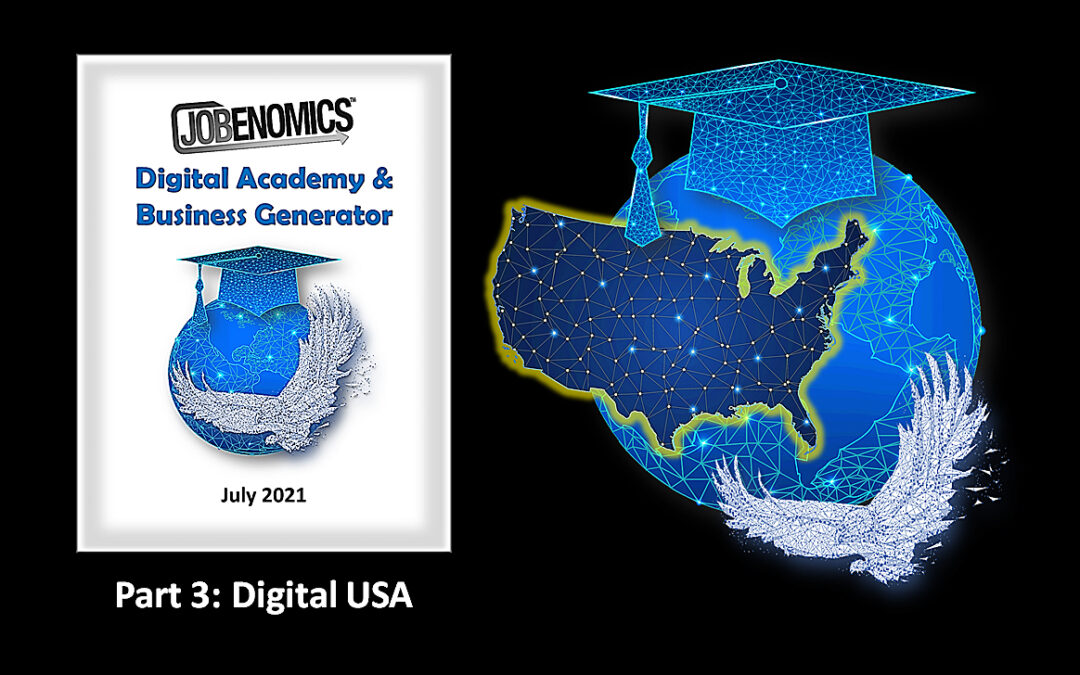Download this excerpt or the 170-page Jobenomics Digital Academy & Business Generator business plan.
Digital startups are ten times easier to create than traditional brick-and-mortar startups. They are also significantly less expensive to start since the bulk of their infrastructure is in the cloud, and support staff is available as needed online. Consequently, the digital economy offers a unique opportunity to mass-produce jobs and startup businesses.
Affordable Jobenomics Digital Academy & Business Generator Centers can generate well-paying digital careers in every city, town, community, or neighborhood that wants to prioritize locally owned business creation. Since only one-third of the U.S. workforce has the digital skills to succeed in the digital domain, the need is great.
Part 3: Digital USA
The digital economy offers a unique opportunity for policymakers to mass-produce jobs and startup businesses. Per a recent Gallup poll, America’s rate small business institutions highest of sixteen categories with an approval rating of 75%, slightly higher than the second-place finisher, the U.S. military, with 72%. The medical system came in third at 51%. The bottom three institutions were big business, television news, and Congress at 19%, 18%, and 13%, respectively.
The 170-page Jobenomics Digital Academy & Business Generator plan is provided free for use and distribution in hopes that it will inspire thought-leaders and policymakers to take action to reskill and upskill the U.S. labor force and mass-produce digital startup businesses.
Jobenomics contends that China’s unified strategic vision and public-private partnership are more mature and competitive than the United States’ business-as-usual approach. Consequently, the United States is relatively uncompetitive against China for supremacy in the emerging digital economy and each of the nine digital economy ecosystems (discussed in Part 1: Digital Economy Introduction). Several hundred trillion dollars and global economic dominance are at stake.
China’s transition from an industrial (mainly manufacturing) economy to a digital economy was breathtaking. It was so rapid and unexpected that U.S. policymakers are now in a quandary about dealing with this new global heavyweight. The conundrum centers on whether China is merely a near-peer competitor or a fearsome adversary. Jobenomics asserts that it is prudent to view China equally as an economic rival and a threat.
To compete with the Chinese digital juggernaut, U.S. policymakers and platform CEOs need to develop a digital domain strategy that enables Americans to become self-sufficient and competitive in the emerging global digital economy. Failing to do so will allow the Chinese to dominate the global digital economy and provide them with the economic hegemony over the global financial system.
As addressed in the previous blog, the United States workforce is woefully ill-equipped to perform and compete effectively in the digital domain. Although most working-age adults use the internet every day, they lack the skills to meet today’s growing demand for trained digital professionals. More than eight out of ten middle-skill jobs require digital skills. Digital middle-skill jobs represent roughly 40% of overall job postings. Yet, the USA has 11 million unfilled job openings—most of which are due to a lack of skills in the digital domain.
Across all industries, data show that two-thirds of U.S. workers have no or limited digital skills. 35% of all workers have only a baseline level of proficiency and struggle with new digital tasks. That leaves only 33% of all workers with sufficient digital skills to prosper in the digital domain. While it might seem that younger workers would be uniformly digitally literate, 43% of U.S. workers aged 16 to 34 have no or limited digital skills. The United States cannot effectively compete in the new economy with this poor talent level.
Digital literacy is the foundation upon which everything in the digital economy depends. To be digitally literate, one must first be literate in basic educational skills. According to the OECD, of the top 77 nations, the USA ranks 13th in reading, 18th in science, and 27th in math. America’s digital near-peer competitor, China, ranks 1st in each of these categories.
Over the next decade, labor demand changes require reskilling and upskilling programs oriented to the emerging digital economy that will generate the preponderance of new American jobs and businesses. To meet the demand for skilled workers, communities will need digital Academies and business generators.
A Jobenomics Digital Academy & Business Generator consists of a combined entrepreneurial and enterprise center to exploit career and business opportunities afforded by the dramatic rise in the digital economy. As the name implies, this institution consists of a Digital Academy and a Business Generator. The Digital Academy attracts, assesses, coaches, trains, and certifies candidates in the digital domain. The Business Generator uses the Jobenomics Community-Based Business Generator process to mass-produce startup firms (e.g., around one hundred new nonemployer firms and micro-businesses per month).
A Jobenomics Digital Academy & Business Generator is a community ecosystem builder. Ecosystem building takes a system-of-systems perspective of a community’s needs, innovation, and entrepreneurial assets, integrates them, and mass-produces startup businesses and sustainable careers in the digital domain. Data shows that for every 1% of startup business growth in an underserved community, poverty and crime are reduced by 2%.
Per the esteemed Kauffman Foundation, ecosystem building is emerging as a new profession at the intersection of economic and community development. Successful ecosystem builders must connect traditional, top-down economic development approaches with the grassroots, bottom-up, community-driven environments where most entrepreneurs thrive. Most communities have all the ingredients for a vibrant digital domain ecosystem but lack the vision and consensus to build one. Jobenomics designed the 170-page Jobenomics Digital Academy & Business Generator plan for community consensus and ecosystem building.
Economic development professionals often create jobs via business incubators, accelerators, and generators. Jobenomics endorses all three methods but specializes in business generators.
- Many cities have business incubators, usually located at or around universities or technology parks, and business accelerators associated with mezzanine financing institutions. Business incubators tend to focus on high-tech, silver bullet innovations with extraordinary growth and employment potential.
- Business accelerators usually focus on expanding existing businesses to make them bigger and more profitable. Accelerators offer a range of support services and mezzanine financing opportunities. Startup accelerators support early-stage, growth-driven companies through education, mentorship, and financing. Startup accelerator financing usually involves venture capital in exchange for equity or an ownership stake.
- A Jobenomics Business Generator involves mass-producing micro (employer firms with 1-19 employees) and nonemployer (firms with no employees) firms, emphasizing highly scalable and repeatable businesses in underserved and under-resourced communities.
The primary purpose of a Digital Academy is to attract, assess, coach, train, and certify candidates in digital technologies via a lifelong applied learning and transformation mapping process. In addition, the Jobenomics Business Generator uses the Jobenomics Community-Based Business Generator process to mass-produce startup firms in underserved or under-resourced communities. The Jobenomics Digital Academy & Business Generator will also include a training and computer center, startup offices, conference room, Entrepreneur Club, and café to be a haven for entrepreneurs. Entrepreneurs like to congregate with other entrepreneurs online and face-to-face.
Digital startups are ten times easier to create than traditional brick-and-mortar startups. They are also significantly less expensive to start since the bulk of their infrastructure is in the cloud, and support staff is available as needed online. Consequently, the fastest way to propel local economies in underserved and under-resourced communities is by mass-producing digital economy startups.
The Jobenomics Digital Academy & Business Generator will contain many digitally-related revenue-generating activities, including an advanced technology computer center, co-working rental offices and conference room, and an Entrepreneur Club and café. In addition to providing onsite co-working facilities for startup firms, Jobenomics will install level Level-3 DC Fast Charging Stations that can charge electric vehicles up to 80% in less than 30 minutes.
Most communities across America do not have high-speed internet or a limited number of broadband providers. In partnership with leading internet providers, Jobenomics is currently analyzing the feasibility of ultra-high-speed open-access networks in communities that want a Jobenomics Digital Academy & Business Generator. It makes little sense to mass-produce digital startups only to have them relocate to areas with network connectivity, speed, and choice of internet providers.
Open-access involves an arrangement where a network is available (open) to all independent service providers and service-related institutions. Today, most residential communities have around 25 Mbps (megabit per second) download and 5 Mbps upload speeds. While these speeds are okay for entertainment purposes, transition to an Internet of Things economy and “smart” homes require around 200 Mbps down and 20 Mbps up internet speeds.
Today, most commercial companies involved in the digital economy require a least 1 Gbps internet speed to be competitive and cost-effective. Like most activities in the digital domain, 1 Gbps will no longer suffice. Consequently, Jobenomics is working with internet providers to install 10 Gbps up and down speeds available to multiple providers on open-access networks.
Part 4. Jobenomic Digital Florida. (Caption) On 23 February 2022, Jobenomics announced its partnership with business and community resource hub, The Lab Orlando to launch Jobenomics Digital Florida. The mission of Jobenomics Digital Florida is to mass-produce startup businesses in the digital domain via the Jobenomics Digital Academy & Business Generators and create a magnet that will generate and attract top talent to build digital communities in the Sunshine State. Jobenomics Digital Florida plan consists of 10 Digital Academy & Business Generators located in metropolitan area Opportunity Zones. Jobenomics designed each Generator to mass-produce a minimum of 100 startup businesses per month or 1,200 new firms per year. Ten Generators would produce 12,000 startups per year statewide.
About Jobenomics
Jobenomics specializes in mass-producing local startup businesses and sustainable jobs in underserved and under-resourced communities. The Jobenomics International Grassroots Movement has reached over 30 million people via national media, Jobenomics TV, website, blog, and lectures. As a result of this exposure, Jobenomics’ unique economic, community, business, and workforce development activities gained international recognition. Over forty cities and regions on four continents implemented Jobenomics Chapters. To meet local citizens’ immediate needs, Jobenomics forms partnerships with leading companies and institutions to create a wide variety of highly scalable startup programs that could quickly mass-produce new locally-owned and operated startup businesses.
The Jobenomics website contains numerous documents on Jobenomics initiatives and turnkey startup business programs. For more information, see https://jobenomics.com/ and https://jobenomics.com/library/.



